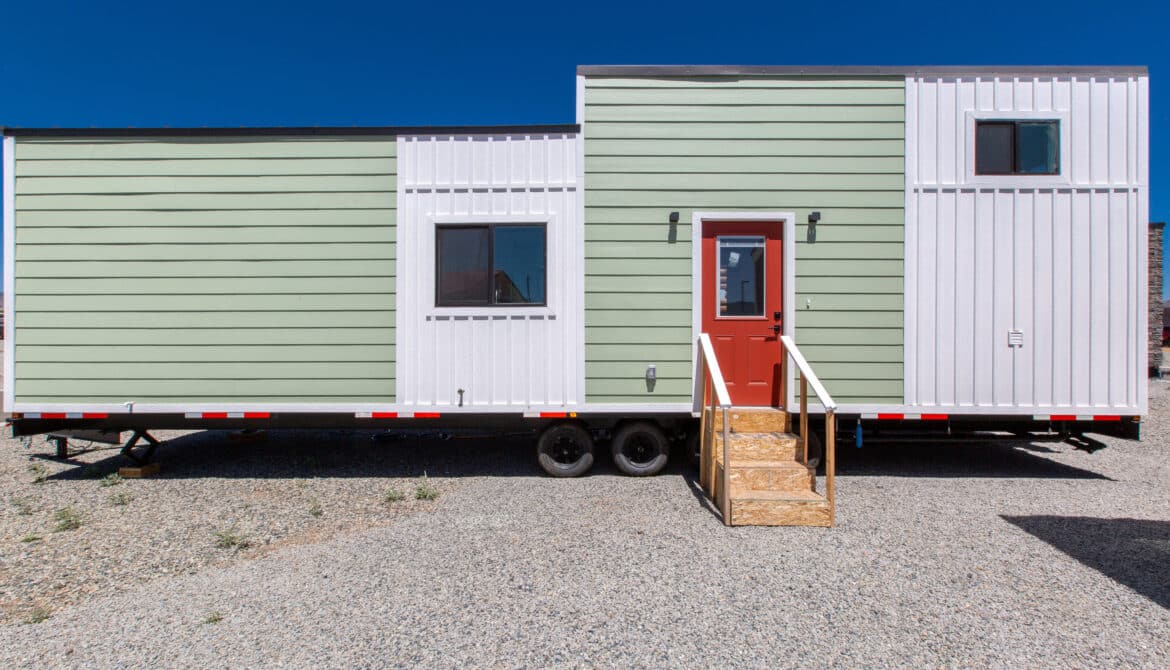Table of Contents
Definition of Tiny Houses on Wheels
Tiny Houses on Wheels (THOWs) are small dwellings that are built on a trailer and can be towed by a vehicle. These homes typically measure between 100 and 400 square feet, and are designed to provide comfortable living spaces with minimal environmental impact. THOWs have become increasingly popular in recent years, as they offer an affordable and sustainable way to live.
Benefits of THOWs
Living in a THOW provides many advantages, including the ability to move from place to place with ease. Additionally, these homes require less energy for heating and cooling than traditional houses, making them more cost-effective. They also require fewer materials for construction, which reduces their overall environmental footprint.
Emergence and Popularity of THOW Lifestyle
The tiny house movement has been gaining momentum since the early 2000s, with people embracing the idea of living simply and sustainably. The popularity of this lifestyle has been driven by a desire for freedom, affordability, and sustainability. As such, more people are turning to THOWs as an alternative form of housing.
Reduced Environmental Impact
THOWs offer numerous environmental benefits, such as reduced energy consumption due to their smaller size. Additionally, they often use renewable energy sources such as solar power or wind turbines for electricity generation. Finally, by using recycled materials in construction, they help reduce waste production.
Design Principles and Ideas for THOWs
Energy Efficiency
Energy efficiency is an important consideration when designing a tiny house on wheels (THOW). The smaller the space, the more important it becomes to maximize the energy efficiency of every component. This includes windows, insulation, appliances, and lighting. Windows should be placed strategically to take advantage of natural light and reduce reliance on artificial light. Insulation should be chosen carefully to provide the best thermal protection while minimizing bulk. Appliances should be chosen for their energy efficiency rating and potential for renewable energy sources such as solar or wind power. Finally, LED lighting should be used whenever possible to reduce energy consumption.
Rainwater Collection
Rainwater collection is another key design element for THOWs. Rainwater can be collected from roof runoff and stored in tanks or cisterns for later use. This water can then be used for drinking, washing, and gardening purposes, reducing dependency on municipal water supplies. To ensure that rainwater is clean and safe to drink, it must first pass through a filtration system before being stored in tanks or cisterns.
Space-Saving Furniture
Space-saving furniture is essential for maximizing the available living space in a THOW. This includes using furniture with built-in storage compartments or drawers as well as multi-functional pieces such as Murphy beds or convertible sofas that can easily be folded up during the day when not in use. Additionally, wall-mounted shelves can help keep surfaces clutter free while providing additional storage space. Finally, collapsible tables and chairs are great options for those who want to make full use of their limited floor space without sacrificing comfort or style.
Design principles for THOWs include energy efficiency, rainwater collection, and space-saving furniture.
Financial Freedom with THOWs
Tiny Houses on Wheels (THOWs) offer a financial freedom that is not possible with traditional home ownership. The lower upfront costs and ongoing expenses associated with THOWs can open up a world of possibilities for those who are looking to escape the burden of a large mortgage and other housing expenses.
Lower Upfront Costs
The cost of a THOW varies depending on the size, materials used, and features included. Generally speaking, however, the cost of building and buying a THOW is substantially lower than the cost of purchasing a conventional house. Additionally, many states have laws that allow people to build their own tiny homes without having to obtain expensive permits or hire contractors. This can save thousands of dollars in upfront costs.
Lower Ongoing Expenses
In addition to the lower upfront costs associated with THOWs, they also offer lower ongoing expenses. These include lower utility bills due to energy-efficient designs, as well as reduced insurance costs since most tiny homes are considered recreational vehicles and therefore do not require standard homeowner’s insurance policies. Furthermore, since most THOWs are mobile and can be moved from place to place, they may not require property taxes or any other fees associated with traditional home ownership.
Overall, owning a THOW offers an unprecedented level of financial freedom for those looking to break free from the burdens of traditional home ownership. The combination of lower upfront costs and ongoing expenses makes it an attractive option for those looking for an affordable way to live without sacrificing quality or comfort.
Lower upfront and ongoing costs offer financial freedom for THOW owners.
Advantages of Off-Grid Living
Off-grid living is becoming increasingly popular among tiny house on wheels (THOWs) owners, as it offers a unique lifestyle with certain advantages. Off-grid living means that an individual is not connected to the traditional power grid and instead relies on alternative energy sources such as solar power, water filtration, propane appliances, and composting systems.
Solar Power
Solar power is one of the most popular forms of off-grid energy for THOWs. With advances in technology, solar panels are becoming increasingly efficient and cost effective. Solar panels can be used to provide electricity for lights, appliances, and other electrical needs. Additionally, solar energy can be stored in batteries for use at night or during periods of cloudy weather.
Water Filtration
For those who choose to live off-grid, water filtration is also an important consideration. Water filtration systems allow individuals to have access to clean drinking water without having to rely on the traditional water supply system. These systems typically consist of a filter and storage tank that can be used to purify contaminated water sources such as streams or lakes.
Propane Appliances
In addition to solar power and water filtration systems, many THOWs owners opt for propane appliances such as refrigerators, stoves, heaters, and more. Propane allows individuals to cook meals and keep food fresh without relying on electricity from the traditional power grid.
Composting Systems & Greywater Systems
Composting systems are also popular among THOWs owners who choose to live off-grid. Composting systems allow individuals to reduce their waste by breaking down organic materials into nutrient-rich soil that can be used for gardening or landscaping projects. Additionally, greywater systems are becoming increasingly popular as they allow individuals to reuse wastewater from sinks and showers for irrigation purposes rather than disposing it into the environment. Finally, rainwater collection systems are another great way for THOWs owners to conserve resources while living off-grid by collecting rainwater for use in gardens or other outdoor projects.
Living off-grid provides individuals with a unique lifestyle that comes with many advantages such as reduced environmental impact through renewable energy sources and conservation methods like composting systems and greywater collection. Additionally, it allows individuals to gain financial freedom by reducing upfront costs and ongoing expenses associated with traditional power grids. Overall, there are many benefits associated with off-grid living that make it a desirable choice for many THOWs owners today.
Conclusion
Tiny Houses on Wheels (THOWs) have become increasingly popular in recent years, offering a unique lifestyle that is both financially and environmentally advantageous. THOWs provide the freedom to live off-grid with minimal upfront and ongoing costs, while also reducing environmental impact. The design principles for THOWs focus on energy efficiency, rainwater collection, and space-saving furniture. Additionally, advantages of living off-grid include solar power, water filtration, propane appliances, and composting systems.
The benefits of living in a THOW are numerous and varied. From the financial freedom to reduce upfront and ongoing costs to the reduced environmental impact of owning a tiny home, it’s easy to see why this lifestyle has become so popular in recent years. With careful planning and consideration of design principles and ideas for THOWs, as well as advantages of off-grid living, anyone can experience the unique lifestyle that comes with owning a Tiny House on Wheels.


